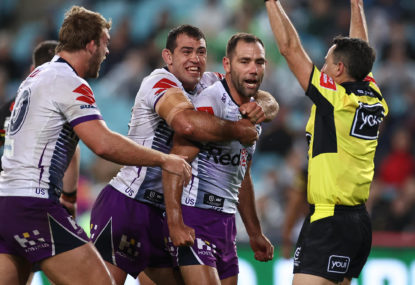JackJumpers' NBL title was special - but where does it sit among Tasmania’s top ten sporting moments?
It’s a pretty good time to be a Tasmanian sports fan right now. After years in the sporting wilderness with not much to celebrate,…

We’ve heard “it’s a game of two halves” and “we gave it 110 per cent” in the post-match press conference.
We’ve had Cam Smith’s need to sprinkle any conversation with “the boys” in reference to theoretically fully grown men.
There’s corporate speak and weasel words, non-apologies and appreciating “the full support of the board”.
Language is a funny thing at the best of times and watching trainwreck interviews with exuberant players forgetting they can’t say f**k on TV or mangling time-worn cliches to the point of incomprehension is its own guilty pleasure.
Sports people are doing their best at a time when they’re either elated or destroyed and, either way, gasping for breath. It’s hard enough making good decisions at the point of exhaustion while playing a game you’ve been trained for, let alone articulating something genuine, thoughtful and non-offensive to some berk holding a microphone for the edification of viewers at home.
For every Joe Mahler there’s a Sam Kasiano, and a whole host of swimmers being interviewed poolside after a 50-metre sprint by someone who’d be puffed after walking it on dry land.
On the matter, however, of what appears to be the pet peeve of the commentariat – the use of the word ‘learnings’ to describe something that can be taken out of a game and then applied in the future – I have a dissenting opinion.
Yes, ‘lesson’ is a perfectly serviceable word that has been around for a long time. But lesson has a profoundly different meaning to learnings.
A lesson is something that is taught, a learning is something that is learnt. Using learnings demonstrates a shift in understanding and a greater insight into the process of improvement – and, perhaps inadvertently, athletes are articulating their personal responsibility for their game.
By using learnings, athletes are taking responsibility for their actions and their performance. It shows maturity, application and an unwillingness to leave the coach to shoulder the blame for the on-field performance.
While we may bemoan the dedication of and suggest that the inability to take a good halftime spray indicates a snowflake mentality, there have been shifts in understanding of how to get the most out of people in various fields, which usually starts with the individual wanting to do improve for their own sake.
So I’m all for players taking learnings out of the game if they can improve their personal performance, become more successful, and entertain me better.